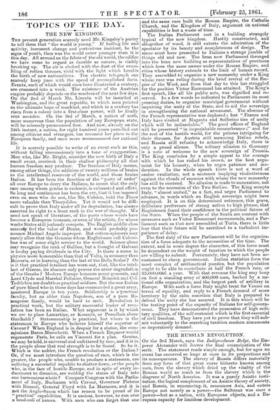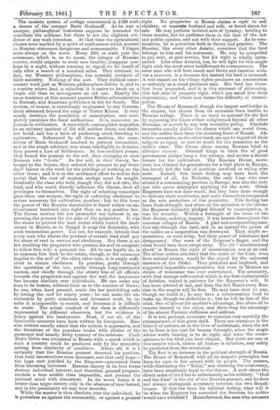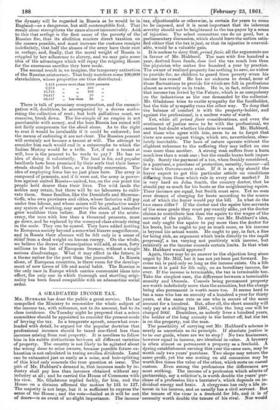THE RUSSIAN REVOLUTION.
-ON the 3rd March, says the Independance Beige, the Em- peror Alexander will decree the final emancipation of the serfs. The statement reads simple enough, but for ages no event has occurred so huge at once in its proportions and its consequences. The slavery of Russia differs materially from any form of that great curse hitherto known among men, from the slavery which dried up the vitality of the Roman world as much as from the slavery which is the disgrace of North America. It was a purely Asiatic insti- tution, the logical complement of an Asiatic theory of society, and Russia, in renouncing- it, renounces Asia, and enters Europe not merely as a power—the Sultanut was once a power—but as a nation, with European objects, and a Eu- ropean capacity for limitless development. The modern system of serfage commenced in 1599 with a decree of the usurper Boris Godunoff. As he was a usurper, philosophical historians suppose he intended to conciliate the noblesse, but there is not ,the slightest evi- dence of any such intention. At that time the agricultural classes were marked by a spirit of restlessness which seemed to Russian statesmen dangerous and unreasonable. Villages were always on the move. Every fifth or sixth year the commune, which is, so to speak, the integer of Russian society, would migrate to some new locality, disappear per- haps in a night, without warning or signal, to be heard of only after a march of a hundred miles. They retained, in fact, say Western philosophers, the nomadic instincts of their ancestry. Nothing of the sort. They disliked unne- cessary work just as Western philosophers dislike it, and in a country where land is valueless it is easier to break up a virgin soil than to reinvigorate an old one. Exactly the same tendency at this moment puzzles British administrators in Burmah, and American politicians in the far South. The system, of course, is exceedingly unpleasant to any Govern- ment advanced beyond the stage of Tartar Khans. It very nearly destroys the possibility of conscription, and com- pletely paralyzes the fiscal authorities. It is, moreover, in- jurious to civilization. A race which contemplates migration as an ordinary incident of life will neither fence, nor drain, nor build, and has a trick of preferring stock breeding to cultivation. Influenced by all these motives, the coun- cillors of Boris Godunoff resolved to prevent locomotion, and in the rough arbitrary way alone intelligible to Asiatics, they passed a Law of Settlement. In less civilized phrase, they bound the peasant to the soil, thus changing at once freemen into "ryots." As the soil, in their theory, be- longed to the boyars, they ordered the peasant to pay three days' labour in the week for the privilege of working on the other three ; and it is in the continued effort to realize this rental that the root of modern serfage must be sought. Gradually the class who held, though they did not own, the land, and who could directly influence the throne, drew all privileges to themselves. The right of selecting conscripts gave them one weapon, the right of enforcing obedience to orders necessary for cultivation, another ; but to this hour the power of the Russian slaveholder is based rather on en- croachment hardened into right than on any positive law. The throne neither felt nor pretended any interest in op- pressing the peasant for the sake of the proprietor. It was the strain to protect the land rental which vested the land- owner in Russia, as in Bengal it vests the Zemindar, with such tremendous power. The law, for example, intends that every man who shares the produce of certain land shall pay his share of rent in service and obedienc. But there is no law enabling the proprietor who permits his serf to emigrate to follow him with a personal tax. All he can legally do, is to summon him back to the estate, though, as the summons implies to the serf of the cities utter ruin, it is amply suffi- cient to ensure obedience. In practice, partly through the operation of the law, partly through long-continued custom, and chiefly through the steady bias of all officials towards the proprietor and against the serf, the landowner has become absolute over individuals. He can order any man to be beaten, without limit as to the number of blows ; he can, when hard pressed, evade the law prohibiting sale by letting the serf for ninety years ; he can make life un- endurable by petty exactions and incessant work, by in- sults it is impossible to resent, and demands it is difficult to evade. The actual conduct of the class is differently represented by different observers, but the evidence is heavy against the landowners. Most, if not all, of the favourable accounts have been written by foreigners. Rus- .sian writers usually admit that the system is oppressive, and the literature of the populace teems with stories of the grotesque and usually filthy tyranny of the noblesse. Uncle Tom's Cabin was circulated in Russia with a speed which in such a country could be produced only by the sympathy arising from similarity of condition. Above all, it is a certainty that the Russian peasant detested his position, that local insurrections were incessant, and that only hope— the hope now justified by the Emperor—prevented them from becoming universal. Russian slavery in its best forms destroy individual interest, and therefore general progress, renders a true middle class impossible, and poisons the national mind with discontent. In its worst forms it is better than negro slavery only in the absence of race hatred, and in the peculiarity we may now describe. While the master is thus absolute over the individual, he Is powerless as against the community, or against a general right.. No proprietor in Russia claims a right to sell children, or separate husband and wife, or breed slaves for sale. He may perform isolated acts of tyranny, tending to those results, but he performs them in the face of the law and public opinion, and not with their support. As to com- munities, he is powerless both in theory and practice. The Russian, like every other Asiatic, considers that the land belongs to him and his commune. He may be compelled to pay rent, or give service, but his right is wholly unim- paired. Like other Asiatics, too, he will fight for this single right with the most utter indifference to consequences. The same man who will bear insult and blows and taxation with- out a murmur, is a freeman the instant his land is menaced. A real assault on his village rights produces an insurrection as certainly as a cloud produces rain. His land has there- fore been respected, and it is this remnant of citizenship, this last relic of property right, which has saved him from degradation, and which now forms the difficulty of emanci- pation. The House of Romanoff, though the largest serf-holder in the empire, has almost from its accession been hostile to Russian serfage. There is no need to account for the fact by supposing the Czars either enlightened beyond all other Russians, or moved by any very recondite policy. Absolute monarchs usually dislike the classes which can resist them, and the nobles have been the resisting force of Russia. Ab- solute monarchs, on the other hand, are apt to regard all their subjects as equal, to care as much for the peasantry as the middle class. The Cmsar alone among Romans tried to alleviate slavery. Oriental kings in their fits of good government always hang a few satraps, and secure a decent tenure for the cultivators. The Russian House, more- over, has thirsted for generations for a high place in Europe, has keenly felt the loss of position involved in ruling over serfs. Indeed, this latter feeling may have been the strongest of all, for -Nicholas, the only Czar who ever attained a commanding position in Europe, was also the only one who never attempted anything for the serfs. Other Emperors have not done much, but they have done enough to indicate their tendencies, and make themselves recognized as the sole protectors of the peasantry. This feeling has been their strength, and when on his accession to the throne the Emperor distinctly pledged himself to emancipation, it was his security. Within a fortnight of the issue of the first decree, ordering inquiry, it was known throughout the remotest villages of Russia. A glad and overpowering emo- tion ran through the land, and in an instant the power of the nobles as a corporation was destroyed. They might re- monstrate, or even delay, but their power of resistance kad disappeared. One wave of the Emperor's finger, and the class would have been swept away. The old "constitutional check" in Russia, the right of assassination, was at an end. The ablest nobles admitted that the death of the Czar, even from natural causes, would be the signal for the universal massacre of the Order. They protested and implored, and suggested impossible compromises, but even in Moscow no dream of resistance was ever entertained. The peasantry, with that strange self-control which is the first characteristic of Asiatics, waited in patience for the Emperor's will. It has been uttered at last, and from the 3rd March every Rus- sian in the empire will be free. He may have rent to pay, though we doubt it ; he may have a compensation fund to make up, though we disbelieve it ; but he will be free of the stick, free of labour for another's advantage, free above all to remove himself to the cities, and there reap the advantage of his almost Parisian shiftiness and address.
It is not, perhaps, necessary to examine very carefully the consequences of this great deed. There are occasions in the history of nations, as in the lives of individuals, when the act to be done is too vast for human foresight, when the single advice worth hearing is to do right, and leave the conse- quences to the God you have obeyed. But there are one or two results which, unless all history is valueless, may safely be predicted from the revolution. The first is an increase in the political strength of Russia. The House of Romanoff, with all its despotic principles, has been for ages in fair accord with its people. The masses, while distrusting the " Tchin," and detesting the aristocracy, have been steadfastly loyal to the throne. A mob obeys the direct order of the Czar as submissively as his soldiery. "God and the Czar" is the cry of the Russian peasant, and he does not always distinguish accurately between the two Benefi- cences. If this has been his habitual feeling, what will it be when the Emperor has conceded the freedom his nobles would have withheld ? Henceforward, the man who menaces the dynasty will be regarded in Russia is he would be in England—as a dangerous, but still contemptible fool. That result alone strengthens the czars almost inconceivably. Add. to this that serfage is the first cause of the poverty of the Russian fisc, that its abolition renders direct taxation on the masses possible, and must increase the customs receipts indefinitely, that half the abuses of the army have their root in serfage, and, finally, that the moral weight of Russia is crippled by her adherence to slavery, and we may gain some idea of the advantages which will repay the reigning House for the enormous sacrifice they have made.
The second result is, we imagine, the temporary extinction of the Russian aristocracy. That body numbers some 100,000 slaveholders, whose properties are thus distributed :
1,424 possess more than 1000 peasants 2,273
77
500 „ 16,740
97 )9
100
97
30,417
17 79
20
58,457 „
less than
20
There is talk of pecuniary compensation, and the emanci- pation will, doubtless, be accompanied by a decree autho- rizing the collection of rent ; but both palliatives must, we conceive, break down. The fee-simple of an empire is not purchasable with money, and the loan Russia has raised will not fairly compensate for the obrok alone. As to the right to rent it would be invaluable if it could be enforced; but the means of enforcing it are not clear. The Russian peasant will certainly not become a tenant at will. The attempt to consider him such would end in a catastrophe to which the Indian Mutiny would be a trifle. Yet, if not a tenant at will, how is the peasant to be made to pay ? He has no idea of doing it voluntarily. The land is his, and popular landlords have been promised by their serfs that their home- steads should be left them, as a friendly concession. The idea of employing force has no just place here. The army is composed of peasants, and if it were not, the army is power- less against united Russia—united, too, on the one point the people hold dearer than their lives. The wild lands the nobles may retain, but there will be no labourers to culti- vate them., Some families, like the Demidoffs and Shereme- tioffs, who own provinces and cities, whose factories will pay under free labour, and whose mines will be productive under any system of working, may survive the shock, and hereafter grow wealthier than before. But the mass of the aristo- cracy, the men with less than a thousand peasants, niust go down, and be replaced by the moneyed class already rising in the scale. They can be spared. They have added nothing to European society beyond a somewhat bizarre magnificence, and in Russia their absence will be felt only in a sense of relief from a dead weight on human energy. On the whole, we believe the decree of emancipation will add, at once, forty millions to the list of European freemen, without a single serious disadvantage. What it may effect in the future, is a theme rather for the poet than the journalist. In Russia alone, of European countries, is there room for the develop- ment of new forms of life and social habit. The Russian is the only race in Europe which carries communist ideas into effect, the only one in which thorough and startling origi- nality has been found compatible with an adamantine social order.
































 Previous page
Previous page